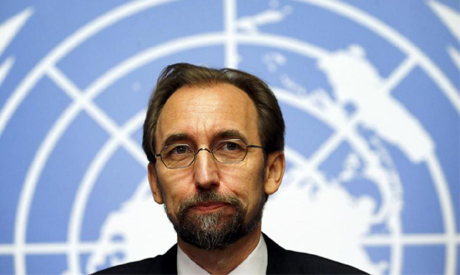
Jordan's Prince Zeid Ra'ad Zeid al-Hussein, U.N. High Commissioner for Human Rights pauses during a news conference at the United Nations European headquarters in Geneva October 16, 2014
The UN human rights chief on Thursday urged the Syrian authorities to release all activists, lawyers and other detainees they have been holding without due process, including some jailed for years.
UN High Commissioner for Human Rights Zeid Ra'ad Al Hussein estimated that between tens of thousands and hundreds of thousands of people have been held at some point in government jails since the first anti-regime protests erupted in Syria nearly four years ago.
"I urge the Syrian Government to immediately release all those who have been jailed for peaceful expression of their views and to ensure that all those detained are accorded their full due process rights," Zeid said in a statement.
He made a special plea for the release of prominent lawyer Mazen Darwish, who was arrested on February 16, 2012 along with Hani Zaitani and Hussein Ghreir, his colleagues at the Syrian Centre for Media and Freedom of Expression (SCM).
"Last month, their trial was postponed for the sixth time with no new hearing date set," Zeid said.
Human rights groups in the last few days also launched a new campaign for the release of Darwish, Zaitani and Ghreir.
"In many cases, people are held incommunicado for weeks or months, in particular by Political Security, State Security, Military Security and Air Force Intelligence branches," Zeid added.
"This is particularly worrying given the Syrian government's record of torture and ill-treatment of detainees, which has been well-documented prior to, and during, the conflict," the high commissioner said.
The anti-government protests that erupted in March 2011 were met by a deadly government crackdown before a civil war broke out.
Zeid's office said militias linked to the government have also abducted activists at checkpoints throughout the country before holding them in their own faclities where they face torture and ill-treatment.
Zeid said detainees who were released reported that they were held in cells of no more than six metres by seven metres (yards) at the Political Security Branch, with up to 55 prisoners per cell and without enough food or medical care.
"They described the use of torture rooms and equipment as well as the extreme cruelty of interrogators," he said.

No comments:
Post a Comment
Note: Only a member of this blog may post a comment.